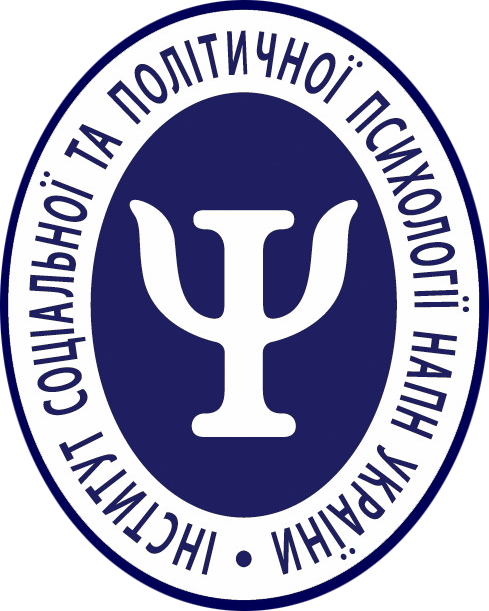Institute of Social and Political Psychology
National Academy of Educational Sciences of Ukraine
The Institute of Social and Political Psychology of the National Academy of Sciences of Ukraine (the Institute) was established on October 14, 1996 by the Presidium of the National Academy of Sciences of Ukraine decision (protocol No. 1–7/11–90) through the Scientific and Practical Center of Political Psychology reorganization (date on the Center organization – January 26, 1994). It has the status of a legal entity of state ownership, the activities of which include research and development in the field of humanitarian and social sciences, market research and the public opinion studies (Reference 15650/04 from the State Register of Enterprises and Organizations of Ukraine). The Institute is a collective member of the Society of Psychologists of Ukraine, the Association of Political Psychologists of Ukraine, and the Sociological Association of Ukraine.
The main activity of the institution is fundamental and applied scientific research, which covers the following main topics:
- theoretical and methodological foundations of social and political psychology;
- comprehensive analysis of the social situation of children and youth personal and civic development;
- psychological mechanisms of individual socialization, improvement of the social adaptation capabilities, personal growth;
- problems of group dynamics, interpersonal and intergroup relations;
- the state, regularities and trends in the development of mass consciousness and behavior;
- socio-psychological factors of formation of young people political and legal consciousness;
- socio-psychological conditions and factors of individual participation in political life, preparation of young people for conscious political choice;
- problems of the psychology of power and political leadership;
- socio-psychological aspects of mass communication, organization of media education of youth, formation of psychological resistance to socially harmful information;
- socio-psychological counseling technologies, forecasting of socio-political processes and influence on their course.
The main scientific departments of the Institute are:
- Laboratory of methodology of psychosocial and political-psychological research,
- Laboratory of social psychology of personality,
- Laboratory of Mass and Communities Psychology,
- Laboratory of psychology of small groups and intergroup relations,
- The Laboratory for Psychology of Youth Political Behavior,
- Laboratory of psychology of communication,
- Laboratory of Psychology of Mass Communication and Media Education,
- Laboratory of Psychology of Political-Legal Relations,
- Scientific-organizational department.
More than 100 researchers work at the Institute, including 3 corresponding members of the National Academy of Sciences of Ukraine, 18 doctors and 48 candidates of sciences. The Institute’s leading scientists are highly qualified experts with significant experience in implementing social analytical projects, particularly in the education field.
Scientists of the Institute actively work in the field of psychological practice. The main areas of work in this area are:
- psychological counseling;
- psychological support of people in crisis and their relatives;
- psychotherapeutic support;
- art therapy;
- socio-psychological trainings, business games, “brainstorming”;
- psychodiagnostic examinations;
- testing of advertising and informational materials, preparation of expert opinions.
The Institute’s scientists have developed and teach training courses in the leading higher educational institutions of Ukraine.
The institute provides training of highly qualified specialists through postgraduate and doctoral studies in specialties 19.00.01 – general psychology. history of psychology; 19.00.05 – social psychology, psychology of social work; 19.00.11 – political psychology for scientific institutions, higher and secondary educational institutions, as well as for state administration bodies, law enforcement agencies, for the social protection system, mass media.
The Institute has a specialized academic council for the defense of doctoral and candidate theses of the same specialties.
